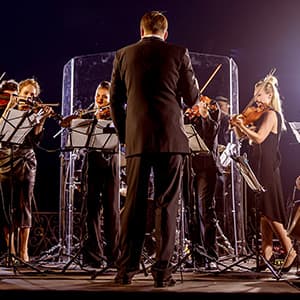

Berlioz Tickets
Up to 30% Off Compared to Competitors.
Location: Select Location (e.g, New York)
Events Nearby
We're Sorry. There are currently no events near you.
About Berlioz
In contemporary times, Berlioz's works continue to be a staple in concert programs around the world, celebrated for their imaginative orchestration and emotional depth. Major symphony orchestras and music festivals frequently feature his compositions, with 'Symphonie fantastique' being a highlight in many concert seasons. In recent years, orchestras such as the London Symphony Orchestra and the Los Angeles Philharmonic have presented performances of Berlioz's works, often accompanied by thematic visual elements to enhance the live concert experience. Additionally, various opera houses are reviving Berlioz's operatic masterpieces, such as 'Benvenuto Cellini' and 'Les Troyens', bringing his dramatic narratives to the stage. The increasing trend of incorporating multimedia and immersive experiences in concerts has also seen Berlioz's music being paired with visual art and technology, providing audiences with a multifaceted engagement with his compositions. Festivals dedicated to Romantic music often highlight Berlioz, celebrating his contributions through dedicated performances, discussions, and workshops. As we look ahead, Berlioz's legacy in the concert world remains vibrant, continuously inspiring new generations of musicians and composers, ensuring his place in the pantheon of great classical music.
Berlioz History
Hector Berlioz, a remarkable figure in the realm of classical music, was born on December 11, 1803, in La Côte-Saint-André, France. His innovative compositions and orchestration techniques were groundbreaking in the early 19th century and significantly influenced the evolution of concert music. Berlioz's career took off with the premiere of his symphonic work, 'Symphonie fantastique', in 1830, which showcased his unique narrative style and vibrant orchestral colors. This piece not only established him as a leading composer of the Romantic era but also changed the concert experience, incorporating dramatic storytelling into symphonic music. Throughout his life, Berlioz was known for his grand concert works such as 'Harold in Italy' and 'Romeo et Juliette', which emphasized the emotional and expressive potential of music. He was also an influential music critic, contributing to the broader understanding and appreciation of concert music during his time. Berlioz's innovative approach to live performances often involved large orchestras and choirs, creating a rich auditory experience that captivated audiences and set a precedent for future concert performances.
